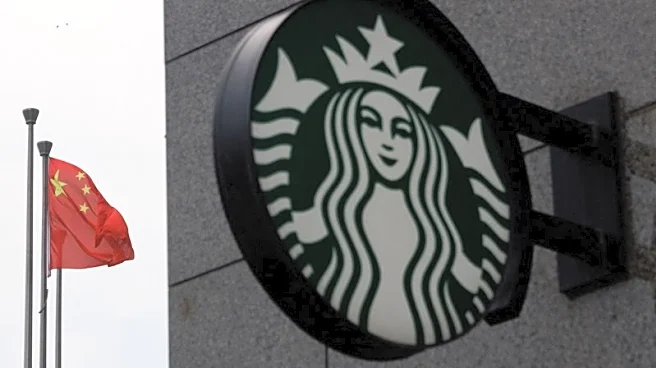By Waylon Cunningham
(Reuters) -Starbucks announced on Monday it was selling a majority stake in its China business to Boyu Capital in a deal valued at $4 billion, about a year after CEO Brian Niccol took
the helm and launched a restructuring.
The company had been running a formal process since May 2025 to bring in a local partner for Starbucks China. Goldman Sachs was advising the Seattle-based company on the sale.
Starbucks is not the first U.S. brand to divest or partially divest its operations in the country as competition grows between the world's two biggest economies.
U.S. President Donald Trump met with Chinese President Xi Jinping on Thursday, extending a delicate trade truce and reaching a deal that averted Trump's threatened 100% tariff on Chinese goods.
Below is a list of other U.S. companies that have trimmed exposure to China.
BEST BUY (2014)
Best Buy exited its retail business in China by selling its 184-store Five Star chain to domestic real estate firm Zhejiang Jiayuan Group, citing a strategic focus in North America. Best Buy has struggled to fend off Chinese rivals in a crowded market, as other U.S. firms have complained that operating in the country has become more of a challenge.
YUM BRANDS (2016)
In 2016, KFC and Pizza Hut owner Yum Brands sold a stake in its Yum China business to investment firm Primavera Capital and an affiliate of Alibaba Group Holding for $460 million.
Later that year, Yum China was spun off and listed separately on the New York Stock Exchange due to activist investor pressure following food scandals and marketing missteps.
Since then, Yum China has grown rapidly between its KFC stores – which at 12,000 stores in China outnumber U.S. locations – and China-specific brands like KCOFFEE.
UBER (2016)
Uber sold its China operations to rival Didi Chuxing in August 2016. In exchange, Uber investors received an equity stake of around 20% in Didi, ending a costly price war. The deal valued the new entity at around $35 billion.
MCDONALD'S (2017)
In 2017, McDonald's sold a majority stake in its China and Hong Kong business to state-backed conglomerate CITIC Ltd and Carlyle Group for up to $2.1 billion. At the time, McDonald's was struggling in the country from a tainted meat scandal and fierce competition from local chains, after years of rapid expansion.
In 2023, McDonald's increased its stake in the Chinese business to 48% by buying Carlyle's 28% share, valuing the holding at $6 billion. McDonald's CEO Chris Kempczinski said the company wanted to "benefit from our fastest growing market's long-term potential."
Beyond fast food, Walmart, the largest U.S. retailer, has made no moves to relinquish even partial control of its China division – though its China unit is not publicly traded. The company is expanding the store count and online presence of its popular Sam's Club discount warehouses in the country.
AMAZON (2017-2019)
To comply with tightening Chinese regulation, Amazon sold certain physical assets of Amazon Web Services' (AWS) cloud business in China to local partner Beijing Sinnet Technology. The sale was valued at around 2 billion yuan.
In 2019 Amazon closed its domestic China marketplace to focus on cross-border commerce and cloud.
GAP (2022-2023)
U.S. apparel retailer Gap agreed in November 2022 to sell its Greater China businesses to Baozun, as the consumer brand faced persistent headwinds in the world's second-largest economy.
Baozun said at the time its unit would pay up to $50 million to acquire Gap Shanghai Commercial and Gap Taiwan Ltd, which operated the entire Gap Greater China business.
The Shanghai entity reported a net loss after tax of 256 million yuan ($35.34 million) for 2021, compared with 456.3 million yuan a year earlier, Baozun said in a filing. The Taiwan entity reported a post-tax net loss of T$199.8 million ($6.24 million) for the year ended January 29, 2022.
(Reporting by Waylon Cunningham, editing by Lisa Jucca and Richard Chang)









